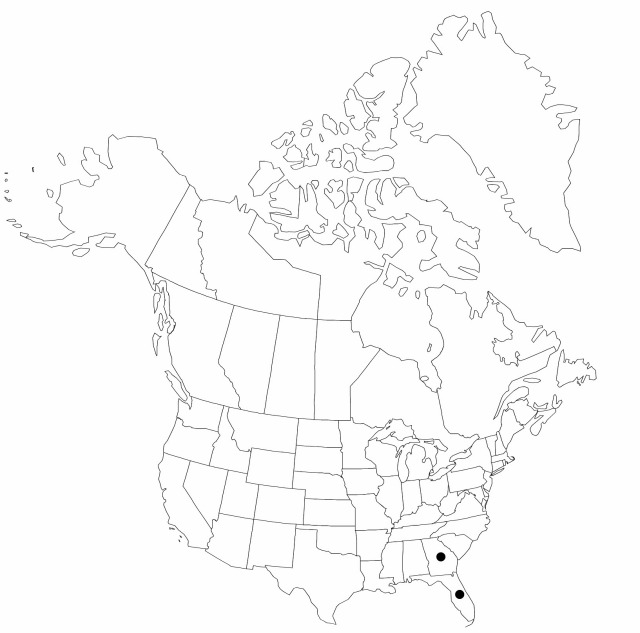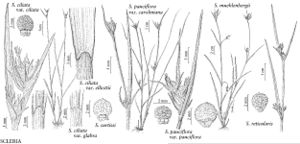Difference between revisions of "Scleria curtissii"
in J. K. Small, Fl. S.E. U.S., 200, 1328. 1903.
FNA>Volume Importer |
imported>Volume Importer |
||
| (6 intermediate revisions by 2 users not shown) | |||
| Line 1: | Line 1: | ||
{{Treatment/ID | {{Treatment/ID | ||
|accepted_name=Scleria curtissii | |accepted_name=Scleria curtissii | ||
| − | |accepted_authority=Britton | + | |accepted_authority=Britton |
|publications={{Treatment/Publication | |publications={{Treatment/Publication | ||
|title=in J. K. Small, Fl. S.E. U.S., | |title=in J. K. Small, Fl. S.E. U.S., | ||
|place=200, 1328. 1903 | |place=200, 1328. 1903 | ||
|year=1903 | |year=1903 | ||
| + | }} | ||
| + | |special_status={{Treatment/ID/Special_status | ||
| + | |code=F | ||
| + | |label=Illustrated | ||
}} | }} | ||
|basionyms= | |basionyms= | ||
| Line 11: | Line 15: | ||
|name=Scleria ciliata var. curtissii | |name=Scleria ciliata var. curtissii | ||
|authority=(Britton) J. W. Kessler | |authority=(Britton) J. W. Kessler | ||
| − | }}{{Treatment/ID/Synonym | + | |rank=variety |
| + | }} {{Treatment/ID/Synonym | ||
|name=Scleria pauciflora var. curtissii | |name=Scleria pauciflora var. curtissii | ||
|authority=(Britton) Fairey | |authority=(Britton) Fairey | ||
| + | |rank=variety | ||
}} | }} | ||
|hierarchy=Cyperaceae;Scleria;Scleria curtissii | |hierarchy=Cyperaceae;Scleria;Scleria curtissii | ||
| Line 29: | Line 35: | ||
|elevation=0–50 m | |elevation=0–50 m | ||
|distribution=Fla.;Ga.;West Indies (Cuba). | |distribution=Fla.;Ga.;West Indies (Cuba). | ||
| − | |discussion=<p>Scleria curtissii was reduced to a variety of S. pauciflora because of the existence in the mountains of Mexico of specimens with some features that appeared intermediate between the two species (J. E. Fairey 1969). The reticulated achenes and slender habit of this narrowly distributed entity, however, still appear striking and not especially similar to the Mexican plants. It is tentatively accorded specific rank here pending a thorough study of the systematics of those Mexican plants. The taxon has also been treated as S. ciliata var. curtissii (J. W. Kessler 1987; R. P. Wunderlin 1998).</p> | + | |discussion=<p><i>Scleria curtissii</i> was reduced to a variety of <i>S. pauciflora</i> because of the existence in the mountains of Mexico of specimens with some features that appeared intermediate between the two species (J. E. Fairey 1969). The reticulated achenes and slender habit of this narrowly distributed entity, however, still appear striking and not especially similar to the Mexican plants. It is tentatively accorded specific rank here pending a thorough study of the systematics of those Mexican plants. The taxon has also been treated as <i>S. ciliata</i> <i></i>var.<i> curtissii</i> (J. W. Kessler 1987; R. P. Wunderlin 1998).</p> |
|tables= | |tables= | ||
|references= | |references= | ||
| Line 38: | Line 44: | ||
-->{{#Taxon: | -->{{#Taxon: | ||
name=Scleria curtissii | name=Scleria curtissii | ||
| − | + | |authority=Britton | |
| − | |authority=Britton | ||
|rank=species | |rank=species | ||
|parent rank=genus | |parent rank=genus | ||
| Line 52: | Line 57: | ||
|publication title=in J. K. Small, Fl. S.E. U.S., | |publication title=in J. K. Small, Fl. S.E. U.S., | ||
|publication year=1903 | |publication year=1903 | ||
| − | |special status= | + | |special status=Illustrated |
| − | |source xml=https:// | + | |source xml=https://bitbucket.org/aafc-mbb/fna-data-curation/src/2e0870ddd59836b60bcf96646a41e87ea5a5943a/coarse_grained_fna_xml/V23/V23_451.xml |
|genus=Scleria | |genus=Scleria | ||
|species=Scleria curtissii | |species=Scleria curtissii | ||
Latest revision as of 20:40, 5 November 2020
Plants perennial; rhizomes nodulose, 3–4 mm thick, very short creeping. Culms ± in tufts, slender, 20–40 cm, glabrous or pilose. Leaves: sheaths reddish, not winged, weakly ribbed, pilose; contra-ligule obtuse to triangular, short; blades channeled, shorter than or equaling inflorescence, 1–2 mm wide, glabrous or sparsely pilose on margins and midvein abaxially. Inflorescences terminal cluster, sometimes with 1 or 2 axillary clusters, 0.4–1.5 cm × 2–8 mm; lateral clusters remote on filiform peduncles; bracts subtending inflorescence erect, short, appearing like continuation of culm, glabrous or sparsely pilose on margins and midvein abaxially. Spikelets bisexual or staminate, 2–5 mm; staminate scales lanceolate, margins scarious; pistillate scales broadly ovate-lanceolate, margins scarious, midvein green, excurrent. Achenes globose or ovoid, 2–3 mm, bluntly umbonate, surface distinctly reticulate, irregularly ridged toward apex, basal papillae reduced or absent, apex bluntly mucronate; hypogynium with 6 rather confined tubercles arranged in pairs.
Phenology: Fruiting summer–fall.
Habitat: Pinelands or oak-pine woods
Elevation: 0–50 m
Distribution

Fla., Ga., West Indies (Cuba).
Discussion
Scleria curtissii was reduced to a variety of S. pauciflora because of the existence in the mountains of Mexico of specimens with some features that appeared intermediate between the two species (J. E. Fairey 1969). The reticulated achenes and slender habit of this narrowly distributed entity, however, still appear striking and not especially similar to the Mexican plants. It is tentatively accorded specific rank here pending a thorough study of the systematics of those Mexican plants. The taxon has also been treated as S. ciliata var. curtissii (J. W. Kessler 1987; R. P. Wunderlin 1998).
Selected References
None.
